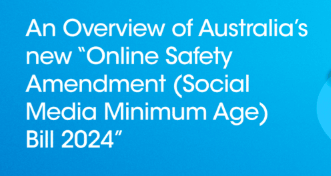Australia’s Online Safety Amendment (Social Media Minimum Age) Bill, 2024
Australia’s House of Representatives has recently passed the “Online Safety Amendment (Social Media Minimum Age) Bill, 2024”, which aims to protect children under 16 from accessing social media platforms. If approved by the Senate and granted Royal Assent, it will establish a legal framework for online safety.
Current Situation
There is currently no minimum legal age for social media use in Australia. Most platforms, however, restrict accounts for children under 13, following U.S. guidelines. The new bill seeks to address the risks associated with social media for younger users.
Key Provisions of the Bill
The bill mandates social media platforms to implement measures to prevent children under 16 from creating accounts. Platforms such as TikTok, Facebook, and Instagram will be affected. The term “reasonable steps” is not explicitly defined in the legislation, leaving room for interpretation.
Compliance and Penalties
Failure to comply with the new regulations could lead to fines, potentially reaching $49.5 million. The eSafety Commissioner will oversee the implementation of guidelines to ensure compliance and promote online safety.
Age Verification and Privacy Concerns
Age verification technologies are a central aspect of the bill. These technologies may collect personal data, raising privacy issues. To mitigate risks, the law mandates the destruction of personal data once it is no longer necessary.
The new rules will not take effect until at least 12 months post-enforcement. During this period, the government plans to consult stakeholders and evaluate suitable age verification technologies.
Criticism and Comparison with Other Countries
The bill has faced criticism for being rushed and potentially ineffective. Critics argue that banning children from social media may not be the optimal solution. Comparatively, Australia is among the first nations to propose such legislation, while the U.S. has struggled with similar attempts.
In India, there are no legal restrictions on children’s social media access. Platforms are required to adhere to rules against online crimes but are shielded from liability for third-party content under Section 79 of the IT Act. The Government of India has not announced plans for similar age restrictions.
GKToday Notes:
- eSafety Commissioner: This Australian role oversees online safety regulations. They provide guidelines for social media compliance. Their authority is crucial for protecting children from harmful online content.
- Digital Duty of Care: This proposed law aims to hold digital platforms accountable for preventing online harm. It reflects growing concerns about user safety. Its implementation is still under discussion in Australia.
- Section 79 of the IT Act: This Indian law protects platforms from liability for third-party content. It allows for user-generated content without legal repercussions. It currently applies to social media in India.
- Children’s Internet Protection Act: This U.S. law mandates filtering technologies in schools. It aims to protect minors from inappropriate content. Its focus is on educational institutions rather than general social media use.
Month: Current Affairs - December, 2024
Category: Legal & Constitution Current Affairs







